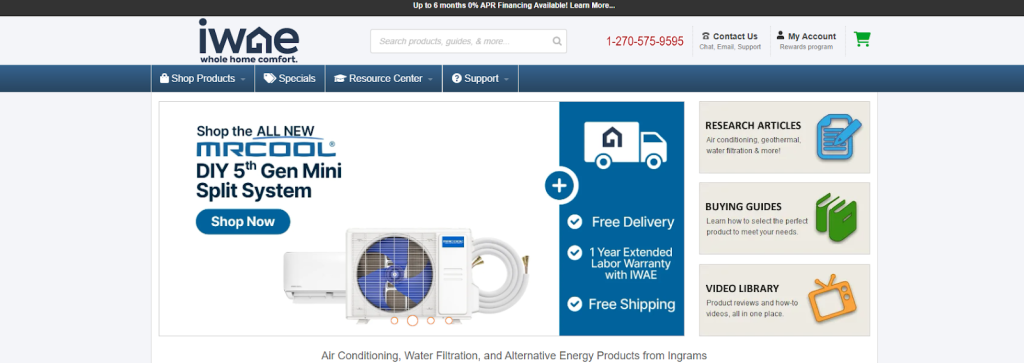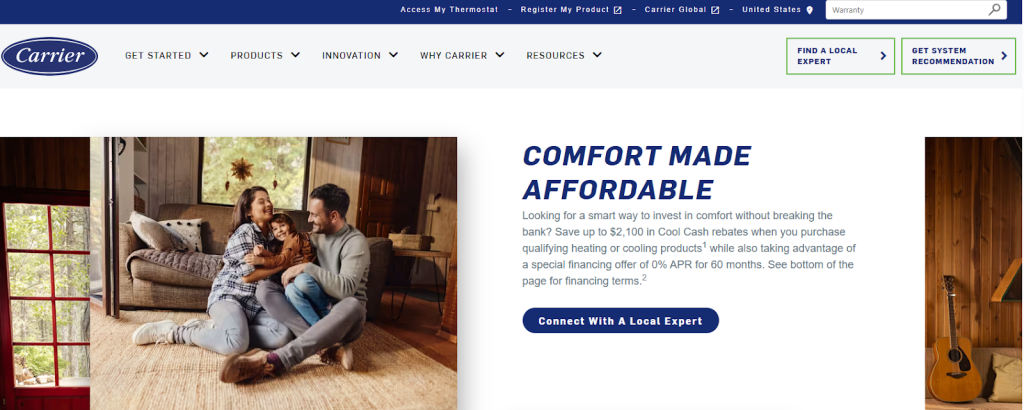A mini split system offers flexibility, efficiency and convenience to keep your home comfortable year-round. Whether you want to upgrade an older house without ductwork or simply cut your energy bills, they have become your go-to choice. But with so many brands and models on the market, choosing the right one can be tricky.
What is a Mini Split System?
A mini split system is an air conditioner for heating and cooling a single room or zone. Typically, an outdoor compressor unit powers one or more indoor units connected by refrigerant lines.
The main difference from “normal” air conditioning is the absence of ductwork in a mini split. This eliminates energy loss through ducts, increasing energy efficiency and allowing for zone-specific temperature control. They are a good option for homes without existing ducts, requiring only a small hole for the refrigerant lines.
The Top 10 Mini Split Systems for Homes
Examine the top-rated companies to help you make an informed, confident decision when investing in a mini split system.
- Ingrams Water and Air Equipment (IWAE)

Ingrams is a leading online retailer specializing in HVAC solutions, including mini split systems, central air and furnaces. With decades of experience, it serves homeowners and contractors nationwide. IWAE stands out for its extensive product selection, competitive pricing and expert customer support. Its website makes it easy to compare, purchase and arrange delivery of top-rated products.
Ingram’s deep inventory includes options from various brands, allowing consumers to choose from the best range of mini split systems for homes. Buyer guides and detailed product information on the site empower homeowners to make informed decisions. The company highlights the energy-saving ratings of each product and showcases advanced features such as auto-mode and smart controls. This customer-first approach and robust after-sales support make Ingrams a best-in-class winner for householders wanting to buy a mini split system.
- Mitsubishi Electric Heating and Air Conditioning

Mitsubishi Electric is a leader in HVAC technology and is renowned for its innovation and reliability. With over a century of experience, the company has set industry standards for ductless mini split systems, offering advanced comfort solutions for your home. Its units are praised for their energy efficiency, quiet operation and precise climate control, making them ideal for zoning and retrofitting older homes.
The company’s inverter-driven compressors and smart controls ensure consistent comfort and lower energy bills. A commitment to quality is evident in robust warranties and a strong dealer network with excellent after-sales support. Mitsubishi Electric’s focus on sustainable and healthy indoor air distinguishes it in the market, making its systems popular for homeowners seeking reliable and eco-friendly solutions.
- Daikin

Daikin is the world’s largest HVAC manufacturer, bringing decades of innovation and expertise to the mini split market. It offers a comprehensive range of systems, heat pumps and VRV multi-zone solutions for residential and commercial use. Its products are known for advanced inverter technology, high SEER ratings and reliability.
Daikin’s commitment to research and development ensures cutting-edge features, such as smart controls and eco-friendly refrigerants. With multiple manufacturing facilities in the U.S., Daikin provides robust support and quick product availability. Its systems are designed for energy savings, comfort and flexibility, making them a good choice for homeowners seeking customizable climate control.
- LG Air Conditioning Technologies

LG Air Conditioning Technologies is a major player in the global HVAC market, offering innovative ducted and duct-free solutions for homes and businesses. Known for sleek design and advanced technology, LG’s mini split systems combine high efficiency with smart home integration, including Wi-Fi and voice assistant compatibility. The product line includes single and multi-zone systems, wall-mounted, floor-mounted and ceiling cassette units, catering to diverse installation needs.
LG’s systems are engineered for quiet operation, reliable performance and user-friendly controls. The company’s commitment to sustainability is evident in its energy-efficient models and use of eco-friendly refrigerants. With a strong brand presence and customer support network, LG stands out for its blend of style, tech and performance.
- Fujitsu General United States

Fujitsu General United States is a trusted provider of high-efficiency heating and cooling solutions, with a strong focus on mini split and VRF systems. Its Airstage line offers advanced comfort for residents, featuring various capacities and configurations. Fujitsu’s mini splits are known for their quiet operation, high SEER ratings and eco-friendly performance.
The company emphasizes customer support, training and technical resources, ensuring homeowners have the guidance they need. With over 40 years in the U.S. market, Fujitsu has built a reputation for reliability, innovation and energy savings. Its systems are ideal for retrofits and homes seeking superior indoor air quality.
- GREE

GREE is one of the world’s largest manufacturers of air conditioners, with a rapidly growing presence in North America. The company offers a wide selection of ductless and mini split systems, including single and multi-zone options, portable AC units and smart controls. GREE’s products are recognized for their affordability, reliability and energy efficiency, making them accessible to a broad range of homeowners.
The company’s mini splits feature inverter technology, quiet operation and user-friendly interfaces. GREE’s global scale allows for robust research, development and quality control, ensuring consistent product performance. The brand’s commitment to innovation and value has earned it a loyal customer base. GREE is a solid contender for those seeking cost-effective, dependable and efficient solutions.
- Pioneer Mini Split

Pioneer Mini Split is a popular direct-to-consumer brand specializing in ductless mini split systems for residential and light commercial use. Based in Miami, Florida, Pioneer offers a wide range of single and multi-zone systems, focusing on affordability and ease of installation. Its products are DIY-friendly, often including pre-charged linesets and comprehensive installation guides.
Pioneer stands out for its competitive pricing, fast shipping and strong customer support, including a 5-year warranty and a 45-day satisfaction guarantee. The company’s online platform makes it easy for homeowners to select, purchase and install their own systems. Budget-conscious consumers and DIY enthusiasts can appreciate its commitment to value, accessibility and customer satisfaction.
- MrCool

MrCool has revolutionized the mini split market with its innovative DIY systems, designed for straightforward installation by homeowners. The brand’s flagship series features pre-charged linesets and simple, tool-free connections, eliminating the need for professional refrigerant handling. MrCool’s product range includes single and multi-zone mini splits, heat pumps and smart home-compatible units. The company emphasizes user empowerment, offering detailed installation resources and responsive customer support.
MrCool’s systems are energy-efficient, reliable and backed by solid warranties. Its focus on innovation, accessibility and customer experience has made it a favorite among DIYers and those seeking hassle-free climate control.
- Carrier

Carrier is a legendary name in HVAC, credited with inventing modern air conditioning. With over a century of experience, Carrier offers a comprehensive range of mini split systems known for their reliability, efficiency and advanced features. Its key product lines — Infinity, Performance and Comfort — cater to various budgets and needs, offering single and multi-zone solutions.
Carrier’s mini splits use inverter technology and smart controls, with high SEER ratings for optimal comfort and energy savings. The brand’s extensive dealer network ensures professional installation and ongoing support. Its reputation for quality, innovation and customer service makes it a trusted choice for householders seeking proven performance and long-term value.
- Trane

Trane is a leader in the HVAC industry, with a legacy spanning over 100 years of innovation, reliability and engineering prowess. Renowned for its robust and durable products, Trane offers a comprehensive selection of ductless mini split systems designed for both residential and light commercial applications. Its systems are designed for high efficiency, quiet operation and precise temperature control, making them ideal for homes without existing ductwork or for targeted climate zones.
Trane’s systems feature advanced inverter technology, smart home compatibility and a variety of unit styles to suit different installation needs. The company is committed to sustainability, offering products with high SEER ratings and eco-friendly refrigerants. It is supported by a vast network of dealers and technicians and provides strong warranties and dependable after-sales service.
Comparing the Top Mini Split Suppliers
There are numerous mini split providers to choose from to meet your home’s heating and cooling needs.
| Company | Years in Business | DIY-Friendly | Smart Home Integration | Nationwide Support |
| Ingrams | 20+ | Yes | Yes | Yes |
| Mitsubishi | 40+ | No | Yes | Yes |
| Daikin | 100+ | No | Yes | Yes |
| LG | 60+ | No | Yes | Yes |
| Fujitsu | 40+ | No | Yes | Yes |
| GREE | 30+ | No | Yes | Yes |
| Pioneer | 20+ | Yes | Yes | Yes |
| MrCool | 10+ | Yes | Yes | Yes |
| Carrier | 100+ | No | Yes | Yes |
| Trane | 100+ | No | Yes | Yes |
How to Choose a Mini Split Supplier
When choosing a supplier, consider the following criteria to narrow down your options:
- Company reputation and years in business
- Product quality and innovation
- Customer reviews
- Range of products and solutions
- Support, warranty and after-sales service
- Accessibility and DIY options
What Type of Mini Split System Do You Need?
Mini splits can be either single-zone or multi-zone. A single-zone setup comprises one outdoor and one indoor unit, while a multi-zone arrangement comprises one outdoor unit for multiple indoor units. The indoor units also come in different styles:
- Wall-mounted: These are the most common type, often mounted high on a wall, above windows or doors, to distribute air evenly.
- Floor-mounted: Installed at floor level, often near a window, to provide targeted heating or cooling.
- Ceiling cassette: Installed in the ceiling to distribute air downwards in a broad, multi-directional pattern. Particularly useful for large rooms.
The best type for you will depend on your requirements:
| Home Type/Need | Best Mini Split Type | Why? |
| Single room or home office | Single-zone, wall-mounted | Simple and cost-effective |
| Whole home | Multi-zone, ceiling cassette | Easy zoning, discreet install |
| Historic or colder homes | Floor-mounted | No ductwork, easy retrofit |
| Open-plan spaces | Ceiling cassette | Even air distribution |
| DIY installation | Wall-mounted, DIY kits | Easiest to install |
Key Features To Look For in a Mini Split System
Depending on your priorities, there are several things to bear in mind when choosing a system.
Energy Efficiency
Look at the SEER (Seasonal Energy Efficiency Ratio) rating. A higher rating indicates a more efficient system, using less electricity to provide the same effect. This translates to lower bills in the long term.
High-SEER units have a greater upfront cost, so look for tax credits or rebates that may be available to qualify high-efficiency mini splits to offset the initial cost.
Heating and Cooling Capacity
The heating and cooling capacity is measured in BTU (British Thermal Units), which determines how much space the unit can heat or cool. It’s important to relate this to your room or zone size. Rooms exposed to a lot of sunlight or regularly used by multiple people will require increased cooling power.
Inverter Technology
Inverter technology allows the compressor to vary its speed and enables smart temperature control. It also tends to provide quieter operation and an extended product lifespan due to reduced wear and tear.
Smart Controls and Connectivity
Look for Wi-Fi, app control or voice assistant compatibility. These functionalities aid in scheduling and remote management.
Noise Levels
A mini split system’s noise level is measured in decibels (dB), with lower numbers being quieter. Check for quiet mode capability and consider your room’s purpose — for example, a bedroom will need a quieter unit than a kitchen.
Air Filters
Most units come with washable, reusable filters that capture large particles like dust and dirt. You may prefer specialty filters, such as nano platinum, to capture fine dust, anti-allergy filters, or deodorizing filters.
Warranty and Support
Check the warranties on compressors and parts. Strong after-sales support is also important.
Aesthetics and Design
Consider whether wall, floor, ceiling or concealed units would best suit your purpose. If desired, research options that match your home decor.
FAQ About Choosing A Mini Split System
A mini split system is a sound investment for your home comfort and air quality. Here are some of the most common questions about them.
How long do mini split systems last?
Most will last 12–20 years with proper maintenance, often outlasting traditional HVAC systems.
Can I use a mini split for both heating and cooling?
Yes. Most modern mini splits are heat pumps, providing efficient winter heating and summer cooling.
Can I install a mini split myself?
You can, but unless it is specifically designed for DIY installation, you may risk voided warranties and home damage. If you want to install it yourself, look for options specifically designed for this — they usually come with a line set already charged with refrigerant and sealed.
How can I find a professional installer?
Check manufacturer websites for certified installers and read local reviews. Ensure your contractor is licensed and insured for HVAC work.
How often should I clean my mini split filters?
Follow the manufacturer’s recommendations for cleaning a mini split system. As a rule of thumb, clean once a month or every other month, depending on the season. If you have pets or have allergies, you might want to increase that frequency to every two weeks.
Invest in a Mini Split for Lasting Home Comfort
Purchasing a mini split system is an investment in your home’s comfort, energy efficiency and long-term value. With many reputable brands and innovative features, now is the time to upgrade your heating and cooling.
By considering your home’s needs and comparing top-rated mini split systems and suppliers, you can find a product that delivers reliable performance and savings for years to come.





